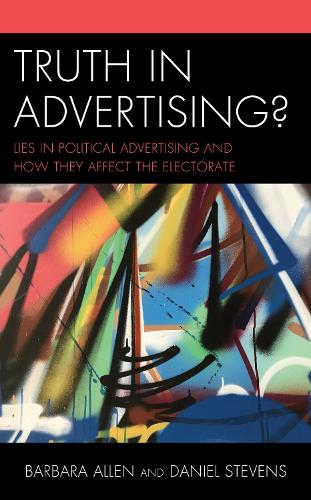
Truth in Advertising: Lies in Political Advertising and How They Affect the Electorate
(Paperback)
Available Formats
Publishing Details
Truth in Advertising: Lies in Political Advertising and How They Affect the Electorate
By (Author) Barbara Allen
By (author) Daniel Stevens
Contributions by Jeffrey Berg
Bloomsbury Publishing PLC
Lexington Books
14th June 2021
United States
Classifications
Professional and Scholarly
Non Fiction
Sales and marketing
Political science and theory
324.730973
Physical Properties
Paperback
475
Width 154mm, Height 218mm, Spine 35mm
708g
Description
This book represents the first systematic effort to examine (1) the factual accuracy of the claims made in an entire political advertising campaign, (2) the visuals and sound cues used in that advertising and their relationship with the tone and accuracy of ads, and (3) the impact of the accuracy of claims on what people know and how they vote in a real campaign. The research is based on several years of labor-intensive coding of the factual accuracy of every claim made in the presidential ads in the 2008 election as well as the ads for the races for the US Congress in Minnesota. We show how the accuracy of political ad claims, the visuals and sound of ads, and ad tone (particularly negativity) are related to voting behavior. We argue that understanding how the accuracy of political ad claims affects voters is now more important than ever.
This research has steered clear of the normative question of what such putative gains in knowledge represent, however. Does the content of negative advertising enhance voter capacities, such as the ability to locate candidates issue positions accurately or state reasons to like or dislike candidates based on accurate information about the candidates traits or issue stands Does the accuracy of the information in political advertising matterto voting behavior or vote choicewhether turnout goes up or down Would voting more, while knowing less that is true be sufficient in a democracy In studying the effects of advertising tone, such questions about advertising tone have not been asked. Our book redresses this lacuna. We show that negative advertising is more likely to make inaccurate claims. We show that ads making inaccurate claims also use a larger number of visual and sound distortions, perhaps tying up more cognitive capacities while pressing their untruthful arguments. We show links between inaccurate advertising and aggregate turnout, individual turnout, and individual political knowledge. The news is not good in an age of post-factual democracies.
Reviews
For almost two decades, I have been following the research of Barbara Allen and Dan Stevens on political advertising. What a treat it is to see such a compelling and important research agenda come together in a book. No one understands truth (and untruth) in political advertisingand how the electorate responds to thatbetter than Allen and Stevens. -- Travis N. Ridout, Washington State University
Few topics are of more contemporary importance than misinformation. This book is a monumental contribution on the topic looking at the dynamics and effects of inaccuracies in political advertising. The results are sobering: there is a lot of inaccuracy and it matters. The book is exhaustive and sets an agenda for future work on electoral campaigns. -- James N. Druckman, Northwestern University
Author Bio
Barbara Allen is professor of political science at Carleton College
Daniel Stevens is professor of politics at the University of Exeter
